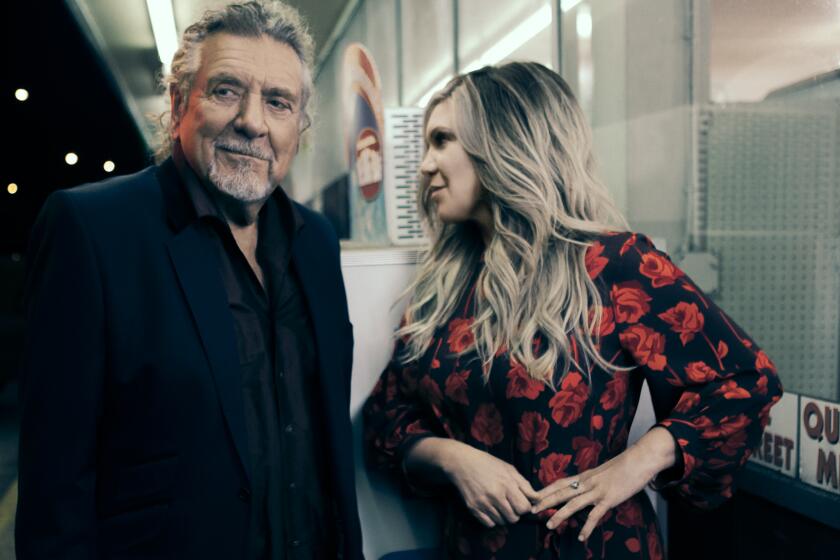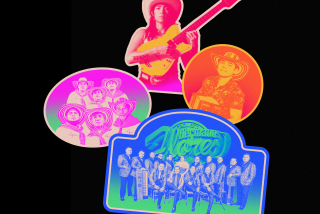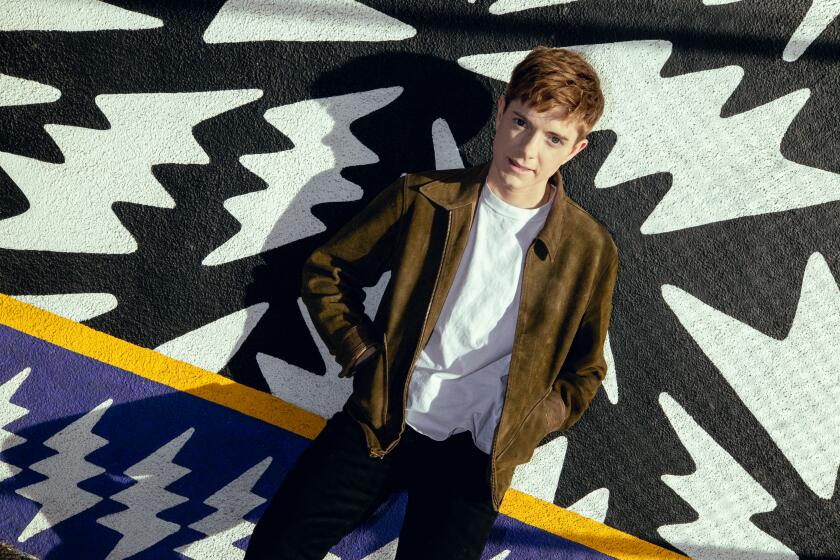He was a samba idol in the clubs of Rio. Now, he’s starting all over again in L.A.
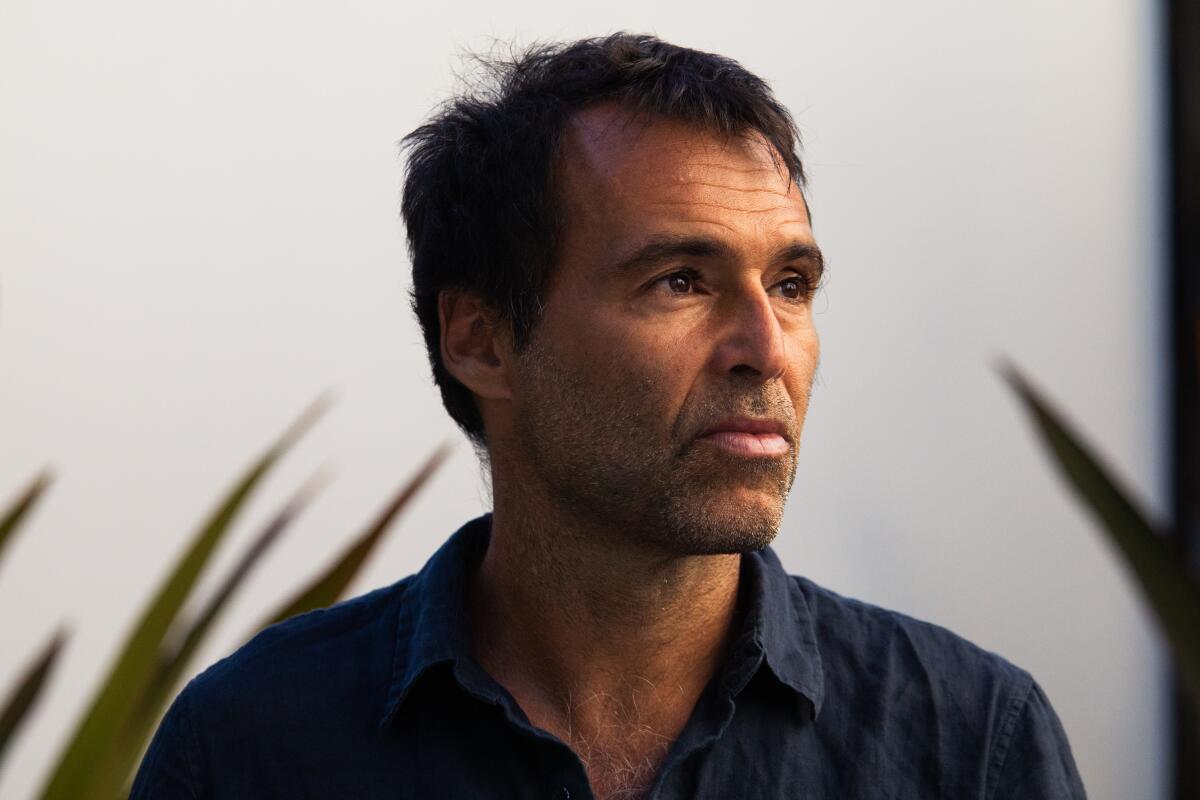
- Share via
Last month in front of Townhouse, a century-old saloon just up the street from Venice Beach, a small, mostly Brazilian crowd danced to the swinging samba-funk of West Hollywood resident Rogê, a former idol of downtown Rio.
In the samba clubs of Lapa, Rio’s bustling center of downtown nightlife, Rogé (pronounced haw-zheh) perfected an athletic art of singing and guitar-playing. It involves improvising high-voltage sets of up to 90 uninterrupted minutes and controlling the room’s energy like a deejay. His tone is graveled but youthfully sweet; only his shouts of “saúde!” (Portuguese for “to your health”) divide the tunes.
At age 47, Rogê not only sings like a star but he also looks like one, with his George Clooney stubble, permanent tan and rock-star swagger. But he calls himself “a typical guy from Rio,” and he shows no airs. When his show at Townhouse ended, Rogê wove through the crowd, hugging both strangers and friends.
Alexandre Kassin, a top Brazilian music producer, calls Rogê “one of the most talented artists of my generation.” Born Roger José Cury, he earned a Latin Grammy nomination for an album he made with his mentor, samba star Arlindo Cruz; together, they wrote the theme song for the 2016 Olympics, which took place in Rio.
But after having sung for more than 20 years in Brazil, where he released eight albums, he remains barely known there beyond Lapa. In 2019, he joined a long line of Brazilian artists — notably Astrud Gilberto, Flora Purim, Sérgio Mendes and Bebel Gilberto — who moved to the States to seek a success that had eluded them back home.

At last it seems as though Rogê is finding his. This weekend, he will open for the Gipsy Kings at the Hollywood Bowl. The gig sprang out of his lavishly produced forthcoming album, “Curyman.” Its mastermind is Tommy Brenneck, a producer and guitarist whose collaborators include Amy Winehouse, Lady Gaga and Jay-Z. Such is his faith in Rogê that he’s using the singer to launch a new label, Diamond West.
“Curyman” isn’t a dance record. Employing a rainbow of rhythms, Rogê sings, in Portuguese, about major themes in Brazil: the dominance of nature; the sovereignty of the orixás (his country’s mythical gods); and, most of all, the need to hang onto hope in the face of intense strife. On the newly released first single, “Pra Vida” (To Life), he sings: “It doesn’t matter if a door is closed / There’s always an open window.”
The album gives a vivid taste of the city that created him. “The music that I write, the way I move, the way I sing — it’s all rooted in Rio,” Rogê says. “I made a lot of progress there. I met my great masters. I wrote sambas for the Carnaval parade. I met the owners of the favelas, the police, the good guys and the bad guys, the rich people and the very poor people. I understand the rules of Rio.”
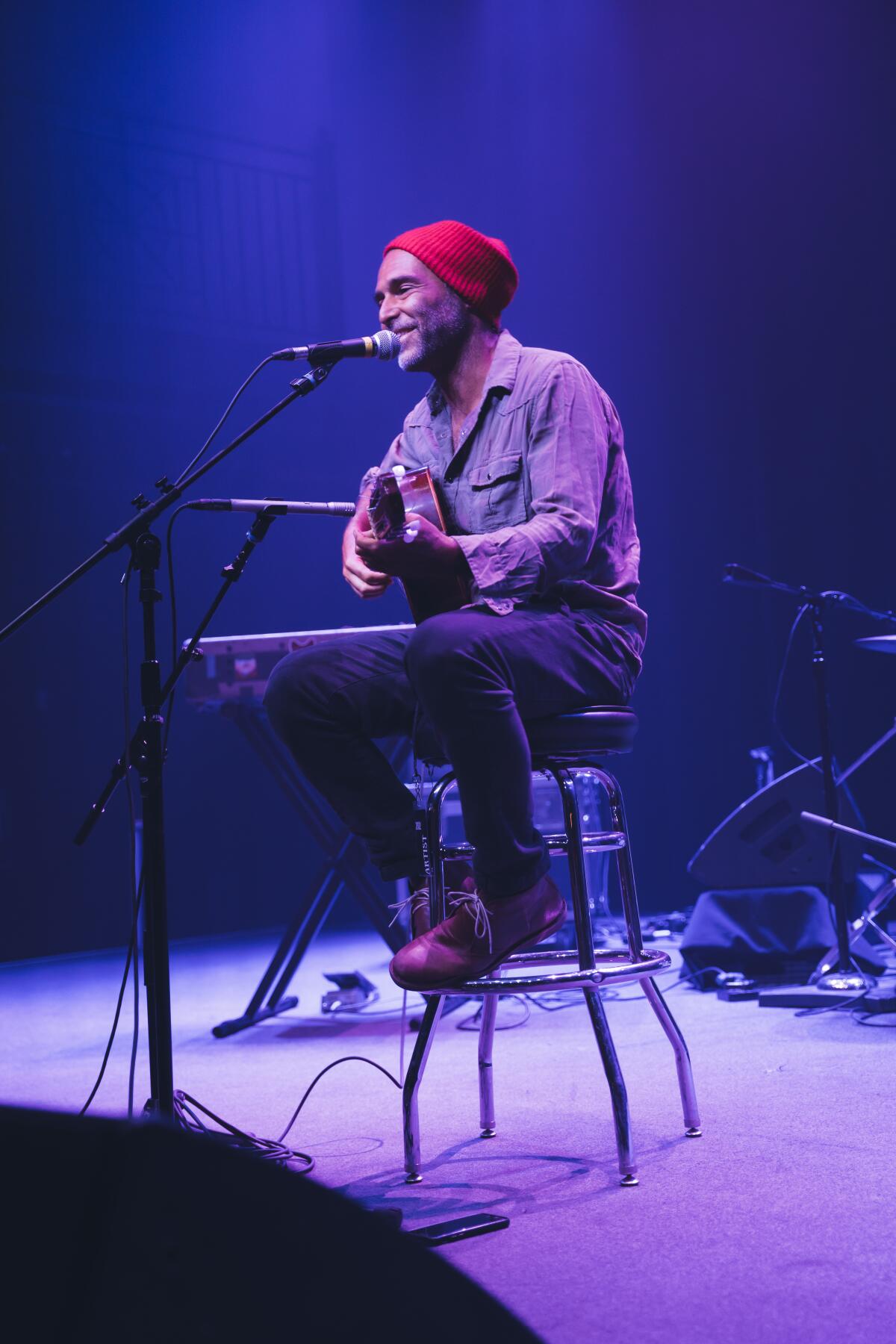
He didn’t learn them through poverty, however. The son of an engineer, Rogê was born and raised in Arpoador, a posh neighborhood between Ipanema and Copacabana. But starting in his teens, he felt the call of Lapa, where samba music and throngs of its fans spill out of clubs and onto the grimy streets. “This was my university,” he says. “I thought, ‘What I have here they can never teach me in school.’”
Cruz was the first of several Black sambistas to befriend him. Cruz took him into the favelas and the suburbs to meet the music’s makers. “I was the only white guy,” Rogê says, and his middle-class pedigree incited mistrust. “But Arlindo brought me like a brother, and he opened up doors for me. I began to compose with him, and people started to respect me.”
Lovato’s snarling new album reveals a star in recovery — not just from drugs and alcohol but from sexual repression, the church and toxic relationships
Rogê was drawn to samba-funk, a contemporary brew of samba, soul, reggae and the slick, orchestrated polish of Motown. In 2008, Lapa’s flagship samba club, Carioca da Gema (Native of Rio), took a chance on Rogê. Two trial nights turned into a 10-year run; on Sunday nights, he filled that home of traditional samba with modern sounds and young fans.
Word spread. Seymour Stein, then a vice president at Warner Bros. Records, tried to launch him internationally with a live CD and companion DVD, “Baile do Brenguelé.” In 2014, when Brazil hosted the World Cup, ESPN chose Rogé to make a series of Brazilian travelogue videos, complete with songs. Still, he stayed an obscure musician in a city whose mounting violence scared him. When he flew to L.A. to perform at the 2018 World Cup, he sensed possibilities.
By the end of the next year, he had taken “a dive into the dark,” he says, and relocated. It meant uprooting his wife and their two sons, who couldn’t speak English; his own was limited. He started over as an unknown, playing at Townhouse on Sundays. Supporting his family, he admits, was “very hard. Some days I went to bed early to not think too much about how I would pay the bills next month.”

In what seemed a stunning break, his idol and friend Seu Jorge, one of the biggest singing stars to emerge from Brazil in the last 25 years, agreed to make an album with him. A Dutch label released it in early 2020. Requests for shows flooded in. Then, after only three concerts, the COVID-19 pandemic sank everything.
Rogê soldiered on, practicing guitar for up to eight hours a day. Calls came in to play on record dates, including that of Robin Thicke’s single “Look Easy.” Last summer, while recording with Molly Lewis, the popular whistler, at the Sound Factory in Hollywood, Rogê met Brenneck, one of the studio’s resident producers. Brenneck had him play and sing several of his songs. He was “blown away on so many levels,” he says, that he asked Rogê to make an album.
Plant and Krauss discuss their first album together in 15 years, their ‘happily incompatible’ friendship and, of course, the chances of a Led Zeppelin reunion.
Brenneck poured a “giant expense” into flying himself and Rogê to Rio and hiring Arthur Verocai, a fabled samba-soul arranger of the ’70s, to add an orchestra to several tracks. All this represents a major gamble for a startup boutique label, but Brenneck reasons: “Songs in Spanish are No. 1 and all over the world. Now, Drake is singing in Spanish. Why not have the words in Portuguese? It’s such soulful music, you can feel it without knowing what the lyrics are.”
Rogê still burns to conquer Brazil, but for now, he says, “I’m prouder of being a Brazilian here, because I’m bringing Americans my culture. It protects me. When I live in that place, when I connect with the orixás, nobody can beat me.”
###
The Gipsy Kings, with Nicolas Reyes and Rogê
Where: The Hollywood Bowl, 2301 N. Highland Ave., L.A.
When: 8 p.m. Friday and Saturday
Cost: $24-$200
Info: hollywoodbowl.com
More to Read
The biggest entertainment stories
Get our big stories about Hollywood, film, television, music, arts, culture and more right in your inbox as soon as they publish.
You may occasionally receive promotional content from the Los Angeles Times.

